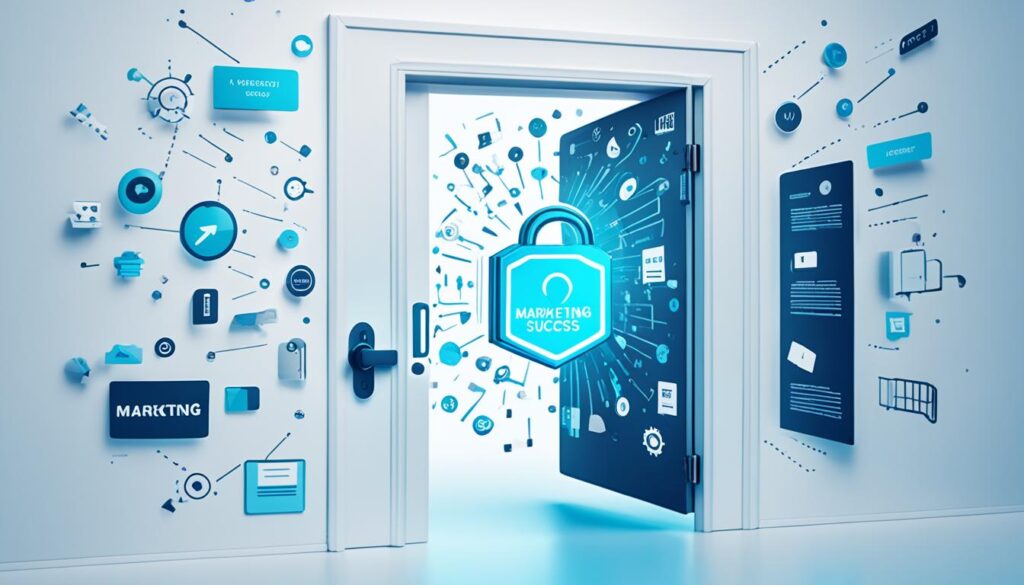“The best way to predict the future is to invent it.” – Alan Kay
Generative AI is changing marketing in big ways. It lets us create detailed and customized content. Epsilon’s report says 80% of consumers like brands more when they get personalized stuff. This shows the importance of content made just for them in winning their interest and sales.
Now, marketing is full of new tools, like ChatGPT, Midjourney, and DALL-E. These help us make lots of good online content fast. Also, with AI tools like GlossAI.co and Lately.ai, we don’t need to spend a lot on video editing. These upgrades make our work easier, giving us more time for planning campaigns, doing market research, and connecting with our community.
Using generative AI in marketing can boost engagement and work better. These tools take over routine jobs and help us make great marketing ideas. The trick is in how generative AI changes our approach to content. It keeps our brand fresh and talks to our audience in a new way.
Key Takeaways
- Generative AI enhances personalized customer experiences, influencing purchase decisions.
- Tools like ChatGPT and Midjourney enable sophisticated and scalable content production.
- AI video editing solutions reduce dependency on costly traditional services.
- The strategic application of generative AI streamlines campaign development and market research.
- Leveraging AI transforms content creation, making it more efficient and tailored to specific brand needs.
Introduction to Generative AI in Marketing
The benefits of generative AI in marketing are huge, changing how we make and share content. This tech lets marketers quickly create all kinds of content, like text, images, and videos. By using generative AI in marketing, pros can be more creative, get more done, and reach people in a personal way.
The University of Virginia Darden School Foundation offers a course series on this topic. It is made for beginners. The series takes about four months to finish, with three hours of study each week. Rajkumar Venkatesan leads the courses, which include:
- Content Marketing Using Generative AI – 1 hour
- Advertising in the Age of Generative AI – 1 hour
- Customer Service in the Age of Generative AI – 50 minutes
- Building Generative AI Capabilities – 3 hours
This specialization is available on Coursera, giving access to over 7,000 courses with Coursera Plus. With Rajkumar Venkatesan’s experience in teaching 15 courses to 370,316 learners, this program offers deep insights into using generative AI.
Using generative AI in marketing makes strategies more flexible, fast, and creative. By adopting generative AI in marketing, brands can make content that truly speaks to their audience. This leads to better engagement and results. For smart marketers, generative AI also means less time on repetitive tasks and more on big-picture thinking.
Here’s a brief look at the courses:
| Course Title | Duration |
|---|---|
| Content Marketing Using Generative AI | 1 hour |
| Advertising in the Age of Generative AI | 1 hour |
| Customer Service in the Age of Generative AI | 50 minutes |
| Building Generative AI Capabilities | 3 hours |
Generative AI is making big changes in marketing. Over 3,400 global companies train their staff with Coursera for Business. This shows they’re serious about keeping up with digital changes. Knowing how to use generative AI in marketing puts professionals ahead in creating efficient, engaging marketing strategies.
Key to Using Generative AI for Marketing
To fully tap into generative AI for marketing, you need a deep knowledge of what it offers. Understanding how to use this tech can make content creation easier. It also helps in planning powerful marketing campaigns.
Understanding Generative AI
Generative AI tools like ChatGPT, Midjourney, and DALL-E are changing the way we create content. These tools help create text, images, and videos quickly and with quality. A 2022 report by MIT Technology Review found that only a few marketing teams see generative AI as crucial now. But, many plan to start using it soon.
“According to a 2023 Salesforce survey of 1,000 marketers, over half are currently using generative AI, with an additional 22% planning to implement it within the next year.”

Benefits of Generative AI in Marketing
Using generative AI in marketing brings many benefits. It makes work faster, boosts creativity, and increases efficiency. It also helps in making marketing more personal. A survey by the Boston Consulting Group in 2023 showed that many marketing leaders are exploring generative AI. They use it for personalization, content creation, and to understand different market segments.
- Predictive analysis for determining the ideal bid range for Google AdWords.
- Personalizing loyalty programs to reduce customer churn.
- Generating relevant product offers to improve customer affinity.
- Developing optimized advertising budgets directly tied to sales touchpoints.
- Customizing real-time interactive customer journeys to convert leads.
- Automating ad performance reporting across multiple platforms.
Setting Up Generative AI Tools
For AI to help your marketing, proper planning is crucial. Choosing the right AI tools for your goals is essential. You also need to plan your rollout carefully, set clear objectives, and consider ethics and laws. A Statista survey in 2023 showed that many marketing experts are already using generative AI tools.
| Key Steps | Details |
|---|---|
| Selecting Tools | Choose AI tools that best match the marketing goals e.g., ChatGPT, Midjourney, DALL-E. |
| Implementation Timelines | Develop a step-by-step timeline to integrate the tools smoothly. |
| Setting Goals | Establish clear and measurable objectives for the AI tools. |
| Ethical Considerations | Ensure AI practices comply with ethical standards and regulations. |
Using generative AI effectively in marketing demands deep understanding and careful planning. As its use grows, staying updated and strategic is vital for success.
Generative AI Marketing Strategies for 2024
In 2024, using generative AI for ads will be key for competitive businesses. AI-driven marketing techniques offer big benefits, like making content fast and tailored campaigns.

More than half of marketers are focusing on AI this year. Why? Because it can majorly boost content, personalization, analytics, and efficiency. That’s why generative AI marketing is a big topic for 2024.
About 37% of marketers think they need to do better to hit their sales and customer goals. This shows a big chance to use AI-driven marketing techniques to make campaigns work better.
| Aspect | Percentage |
|---|---|
| MarTech Investments | 60% |
| CMO Challenges | 37% |
| Campaign Performance (Met Expectations) | 46% |
| Operational Excellence (Needs Improvement) | 33% |
| Customer Data and Engagement | 50% |
| Digital Skills Possession | 83% |
| Regional Disparities (Europe vs. North America) | 40% vs. 23% |
Collecting customer data and analyzing it is key, say half the marketing leaders. They see using generative AI to improve this as the way forward. Also, 83% of CMOs say their teams are ready to use these tools.
Generative AI should make content and marketing more personal. This could really help get more people interested. Plus, chatbots and helpers that use AI make talking to users smoother and improve their experience.
AI-made graphics and designs are hitting the mark with audiences now. Adding predictive analysis lets marketers get ahead of trends. This way, they can keep people engaged and see better returns on their investments.
Benefits of Generative AI in Marketing Campaigns
Generative AI is transforming marketing. It enhances content creation and boosts efficiency. Its impact on marketing is significant.
Enhanced Content Creation
Generative AI upgrades content creation. It quickly produces a lot of creative content. This lets marketers handle many channels easily.
A 2023 Salesforce survey found over half of marketers use generative AI. This shows its practical benefits in marketing.
Scalable Personalization
Generative AI offers scalable personalization. It focuses on what customers like, leading to more sales. A Deloitte study in 2023 found 41% of marketing groups use AI to keep marketing personal.
Improved Efficiency and Productivity
Generative AI makes tasks quicker and lets teams focus on big ideas. This drives innovation. A Statista survey in 2023 said 73% of marketing pros use generative AI to get more done.
| Usage Stats | Survey Source |
|---|---|
| 5% of marketing organizations considered generative AI “critical” | MIT Technology Review, 2022 |
| 41% adoption rate in marketing, sales, and customer service organizations | Deloitte, 2023 |
| Over half of marketers already using generative AI | Salesforce, 2023 |
| 73% of marketing professionals utilizing generative AI | Statista, 2023 |
Top Generative AI Tools for Marketers
In today’s fast-paced marketing world, generative AI tools for marketers boost creativity and efficiency. OpenAI’s ChatGPT shines by crafting engaging text content. It has changed how we create content with templates in 25 languages, fitting many marketing needs.
Midjourney and DALL-E excel in creating visual content. They help marketers make quality images without the effort of traditional graphic design. GlossAI.co and Lately.ai simplify video editing, letting teams focus on creativity.

Adobe’s tools, like Adobe Express with Firefly and Adobe Document Cloud, make creating and sharing content easier. Adobe Scan turns paper into digital, fitting right into marketing plans. AI helps in tailoring content for each customer, as a McKinsey & Co survey showed people expect brands to recognize them.
Handling data for personalization needs powerful tools. For example, Sprout Social’s AI can analyze vast amounts of data quickly. It processes messages to help with market segmentation and strategies.
Tools like Keyword Insights and Jasper speed up making and improving content. Keyword Insights does research, writing, and SEO in one. Jasper helps with content creation in many languages. Surfer SEO increases content’s search rankings by analyzing SERPs and offering keyword-based advice.
Writer.com provides a thorough writing assistant for marketing. It checks grammar and keeps content consistent. Platforms like Content at Scale and Originality AI ensure AI content feels human.
As 2024 approaches, AI tools will shape digital marketing’s future. These tools make hard tasks easier and faster. More marketers are using AI to improve customer service and refine marketing strategies.
| Tool | Function | Standout Feature |
|---|---|---|
| ChatGPT | Text-based content | Supports 25 languages |
| Midjourney | Visual content | High-quality image creation |
| DALL-E | Image generation | High-resolution output |
| GlossAI.co | Video editing | Automated processes |
| Adobe Express | Content creation | Firefly capabilities |
Implementing AI in Marketing Strategies
For a business to successfully adopt AI in marketing, a well-thought strategy is crucial. A step-by-step approach helps businesses integrate generative AI smoothly into their marketing work. Here’s a structured guide to AI marketing implementation, along with real-world case studies that show the big changes it can bring.
Step-by-Step Guide to Implementation
- Selecting the Right Tool: Find AI tools that match your marketing goals. This could be for creating content, automating customer support, or analytics that predict future trends.
- Planning Timelines: Make a detailed plan with key steps and deadlines for adding AI to your work. This keeps everyone on the same page and on track.
- Allocating Budgets: Set aside funds for buying AI tools and training your team. Consider the return on investment through better efficiency and marketing results.
- Setting Measurable Goals: Create clear, measurable goals to track AI’s effect on marketing, like more customer interest or higher sales.
- AI Ethics Framework: Follow ethical rules that protect customer privacy and make AI marketing transparent and fair.
Case Studies of Successful AI Integration
Looking at successful AI use provides insight into its benefits. Here are examples from leading companies that show how AI has improved their marketing:
| Company | Application | Result |
|---|---|---|
| Salesforce | Customer Service Automation | 41% adoption rate with faster responses to customers |
| Boston Consulting Group | Personalization and Content Creation | 67% of executives leaned into AI for greater engagement |
| Insider’s Sirius AI™ | Optimizing Customer Experiences | Better customer journeys, boosting loyalty and happiness |
Leveraging Generative AI for Targeted Advertising
Generative AI is changing advertising in a big way. It allows for ads that really speak to each person. Marketers are now using generative AI to make their strategies smarter, using data and insights as they come.
With AI, ads get very personal, which makes customers happier and more loyal. Ads reach the right people, matching what they like and do. This means content strikes a chord every time.
Generative AI makes ads more creative and interesting. It uses machine learning for fresh, catchy content. Brands can then grab their audience’s attention in new ways. And because it’s smart, it can change tactics based on what people like, making ads more effective.
Also, AI makes spending on ads smarter. It gives insights to tweak strategies on the go. This way, money is spent wisely, boosting results and cutting down on waste.
Some companies are already seeing big wins. Buykaro.com’s sales went up 30%, and their customers were 20% happier due to AI-driven recommendations. ZaimInternational saw fewer returns by 25% and increased sales conversions by 15% thanks to AI that lets customers try things on virtually.
But there are challenges. We must use data wisely and think about privacy and legal issues. And, we need to make sure the AI ads stay true to the brand.
In short, leveraging generative AI for targeted advertising opens new doors. It leads to marketing that’s more personal, alive, and successful. Adopting AI in ads means better experiences for customers and fantastic results for brands.
AI-Driven Marketing Techniques to Boost Engagement
Nowadays, using AI-driven marketing is key to better customer engagement. Through AI, companies can interact with customers automatically, suggest content that fits each person, and predict marketing success. These smart strategies make marketing smoother and help us connect more with our audience.
Automated Customer Interactions
Chatbots and similar tools offer help any time, improving customer happiness. They handle market and customer info well, making marketing very personal. Also, with AI, creating blogs and web content is quicker. This is something 64.7% of CMOs plan to do for blogs, and 62.2% for web content.
These automatic systems also make it easy to understand our data, giving us quick insights.
Personalized Content Recommendations
Offering content that fits each customer keeps marketing relevant and engaging. With AI, creating content for different people and places gets better. It looks at what customers like and offers them things they enjoy, which keeps them more interested.
Some groups worry about data privacy with AI, but careful rules can solve these problems. This ensures that AI is used safely and ethically in our marketing plans.
Predictive Marketing Tactics
AI helps predict future buying trends, letting us adjust our strategies early. It can summarize vast amounts of data, like academic papers, in 30 minutes. This gives marketers important information quickly.
Money invested in AI is expected to grow from $19.4 billion in 2023 to $151 billion by 2027. This shows how big AI’s role could be. To use AI well, we need clear goals and the right people to follow data rules.
By using these AI strategies, we can make experiences customers will remember, build stronger relationships, and stay ahead in the market.



